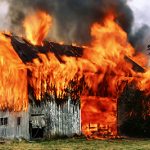Do You Know The Difference Between Arson And An Incendiary Fire?
 American English has a rich and complex history, having first incorporated words from many different colonization and immigration waves, and then in recent history having invented or created words for rapidly advancing technology. A simple word like “fault” can mean entirely different things depending on the context and field of use. A “fault” in electrical engineering may mean a short between two electrical lines of different polarities. In control logic, a “fault” could be a measured or detected failed signal or logic state. A “fault” in geology could mean the boundary between plates in the Earth’s crust. “Fault” in the legal field refers to responsibility.
American English has a rich and complex history, having first incorporated words from many different colonization and immigration waves, and then in recent history having invented or created words for rapidly advancing technology. A simple word like “fault” can mean entirely different things depending on the context and field of use. A “fault” in electrical engineering may mean a short between two electrical lines of different polarities. In control logic, a “fault” could be a measured or detected failed signal or logic state. A “fault” in geology could mean the boundary between plates in the Earth’s crust. “Fault” in the legal field refers to responsibility.
In kind, the terminology used in fire investigation, fire science, and fire reports may not mean what the general public may think it means. Here are some examples of terms of art (reference NFPA 921):
- Arson – The crime of maliciously and intentionally, or recklessly, starting a fire or causing an explosion.
- Incendiary – A fire intentionally ignited under circumstances where the person knows the fire should not be ignited.
- Combustible – Capable of burning in air under normal conditions of temperature and pressure.
- Flammable – Capable of burning with a flame.
- Inflammable – Flammable. Inflammable is an older term that has generally become obsolete due to confusion. Inflammable is a synonym for flammable and may appear in older labels and signs.
- Noncombustible material – a material that, in the form in which it is used and under the condition anticipated, will not ignite, burn, support combustion or release flammable vapors when subject to fire or heat.
- Incombustible material – Noncombustible material. Again, an older term generally obsolete due to confusion.
- Nonflammable – not readily capable of burning with a flame.
- Unflammable – term doesn’t exist in the dictionary.
- Uninflammable – incapable of combustion. Term is generally not used due to confusion.
So, an arson fire is more likely than not an incendiary fire, but an incendiary fire may not be arson. A combustible material is flammable, but a flammable material may not be combustible. And we should all avoid using the words starting with in- or un- as they pertain to fire reporting.
When you have questions about fire reports or investigations, ARCCA has the experienced engineers qualified to provide answers.
PETER CHEN, M.S.M.E., M.B.A., P.E., CFEI, ACTAR, is a mechanical engineer at ARCCA specializing in Accident Reconstruction, Fire Cause/Origin, Product Failure/Liability, Car/Truck Failure Analysis, Industrial Equipment, Worksite Safety, Aviation, Medical/Rehabilitative and Exercise Equipment, Warnings and Instructions, and Transportation, including Railroad incidents. He is ACTAR-certified, a Certified Fire/Explosion Investigator, a Certified Crash Data Retrieval Analyst and a JLG Certified Equipment Trainer.
